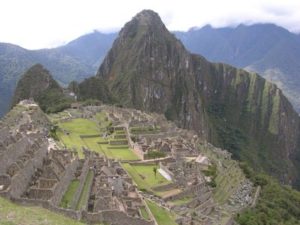We’ve traveled to a fair number of ancient sacred sites in the past twenty years; always wondering what this building was like or how that road looked thousands of years ago. Now we’re wondering what future visitors will think when they visit our cities and venture into our ruins? We posed this question to people recently and the responses were interesting.
For the most part, we were told that we have better ways of recording our history so future generations won’t have to guess. We replied, with a smile, that our ancestors probably thought the same thing and yet, we are still unraveling their history.
Another very disturbing response was that it doesn’t really matter what future generations think of us or what we leave behind. This didn’t bring a smile to our faces. It did make us realize that some people may not be paying as much attention as we thought. Politely, very politely, we told them that it did matter. We explained that future generations’ very existence may be at risk, and to a large degree, this is our responsibility today.
So where are we going with this? When we pass a mountainous a garbage dump or broken-down, abandoned factory, we wonder what the future will think of our time? Our ancestors used what they needed and lived in balance with the planet. Then, the next generations took more from the planet as populations grew and power became associated with those who had more than others. With this, our imbalance with the planet grew. Now, we continue to grow this imbalance to our own and to future generations’ peril.
The one point that became clear from these conversations was that change will never be an all or nothing venture: there will always be those who do not want to change. The tipping point, where more people want to change than do not, is most important. When humankind has more individuals who are aware of this than those who are not, then perhaps we can find balance with our planet again.
We were watching the television series “Mars” recently and saw the story, in amazement, that people still followed an aggressive urge to plunder when in search of a new home – all for power and monetary gain. We think the storytellers are correct. Why would we think it would be otherwise or that going to a new world would change this urge? It won’t – unless we change ourselves. Without a change in our own awareness, humans would probably ravage a new planet without much care for the consequences.
Why did gaining power and money become more important than sustaining our home for future generations? We think one answer might be: the greed of individual gain rather than the good of the whole. It’s possible, we hope, that this will change, but in the meantime, it seems our planet has started to fight back. Intensified weather disturbances, amplified seismic activity, and increased microbial variation may be all signs that earth is sending a signal to us. Are we the next casualty?
We all need to start working with our planet and each other. The earth was around long before we arrived and it will be around long after we’re gone. Which side of the scale do you want to be on? Will your great, great grandchildren have a chance to be on that scale? If future generations come to be, what will they think?
If this topic interests you, check out these organizations that are trying to reverse this trend:
UNITED NATIONS COUNCIL ON CLIMATE CHANGE
IT’S UP TO ALL OF US TO TAKE ACTION



